corpus luteal cyst
Corpus luteal (CL) cysts are a type of functional ovarian cyst that results when a corpus luteum fails to regress following the release of an ovum. When associated with pregnancy, it is the most common pelvic mass encountered within the 1trimester. There is also some overlap with the term "hemorrhagic corpus luteum".
Pathology
The natural history of a normal corpus luteum is to regress by the end of the 1 trimester if pregnancy has occurred. If a corpus luteum fails to regress and instead enlarges with or without hemorrhage, a corpus luteum cyst is formed. There is some overlap in the definitions of a corpus luteum cyst and a hemorrhagic corpus luteum .
Natural course
When associated with pregnancy, most corpus luteal cysts spontaneously involute at the end of the 2 trimester.
Radiographic features
Ultrasound
They can have a range of sonographic appearances depending on the stage of evolution and age of the associated intracystic hemorrhage . General characteristics include :
- diffusely thick wall
- peripheral vascularity
- usually 2-10 cm
- possible crenulated contour
If the cyst has been present for some time with complicating hemorrhage, a fine internal lace-like echo-pattern may be seen.
Color Doppler shows either no vascularity within the cyst or shows low resistance blood flow around the cyst, also known as hypervascular ''ring of fire''.
CT
- low-attenuating cyst (25 HU)
- 2-10 cm in diameter with thickened walls
- slightly irregular cyst
- iso- or hyperattenuating walls
- free fluid is often associated
MRI
It is often seen as a round or oval adnexal lesion.
- T1: typically homogeneously hypointense
- T2: typically hyperintense
- T1 C+ (Gd): intense wall enhancement may be seen
Treatment and prognosis
For a corpus luteal cyst ≤3 cm, no follow up is necessary .
Complications
Differential diagnosis
It can be difficult to differentiate from a tubal ring in ectopic pregnancy in some situations, and correct clinical interpretation is often required.
See also
Siehe auch:
und weiter:

 Assoziationen und Differentialdiagnosen zu Corpus luteum Zyste:
Assoziationen und Differentialdiagnosen zu Corpus luteum Zyste:



